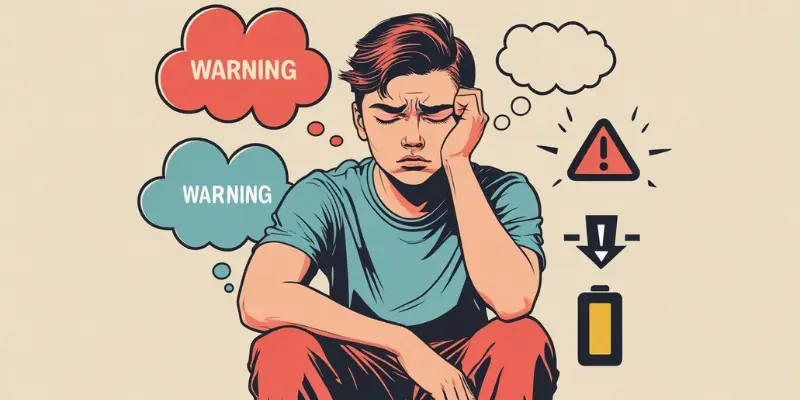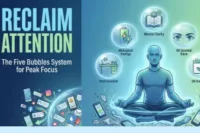Self-Preservation Skills: The Definitive Guide to Emotional Security and Thriving in a Complex World
Published: 25/08/2025
Are you constantly hitting burnout, running on empty, and feeling guilty for taking even a single moment to breathe? If you’re like many high-achievers, the pressure to keep going, to perform, to be “enough” can be overwhelming. You feel emotionally drained, constantly giving more of yourself than you have, and yet, you still find it hard to feel at peace. This emotional depletion isn’t just a temporary phase—it’s the result of a deeper issue that, if left unchecked, can take a serious toll on your well-being.
But here’s the truth: self-preservation is not selfish. It’s not a luxury or something reserved for the “lucky few.” It’s a skill—one that can be learned, practiced, and mastered. When you prioritize self-preservation, you don’t just survive—you thrive. In fact, it’s essential for maintaining your emotional security and long-term success. By mastering the art of self-preservation, you create the space to recharge, to protect your mental health, and to show up as the best version of yourself in both personal and professional settings.
This definitive guide is your first step towards moving beyond instinct—beyond simply reacting to life’s demands—and towards a place where you can actively protect your emotional well-being. In this guide, you’ll not only understand the science behind self-preservation, but you’ll also diagnose where you’re currently struggling. Most importantly, you’ll discover 5 core protective skills that you can start applying immediately to reclaim your peace and transform your approach to life.
The Science of Survival: From Caveman Instinct to Chronic Stress (The “Why?”)
Our ancient survival instincts were designed to keep us safe from immediate threats. In the face of danger, our bodies react with a series of physiological changes that prepare us to either fight, flee, or freeze. But in today’s world, these instincts—while still essential—often fail to serve us well, leading to chronic stress and burnout. Let’s break down why this happens.
Why Your Ancient Instinct Fails in Modern Life (Maladaptation)
Our brains evolved to handle the threats our ancestors faced, such as predators or physical danger. The amygdala, often referred to as the “alarm system” of the brain, would trigger the body’s stress response in these situations. However, modern life rarely presents immediate, physical threats. Instead, we’re bombarded by chronic stressors like work pressure, financial worries, and social expectations.
The Fight-Flight-Freeze Trigger
When you encounter stress, the amygdala signals the hypothalamus, which triggers the release of adrenaline and cortisol. These hormones flood the body, preparing you to act quickly—fight, run, or freeze. In ancient times, this would happen during a life-or-death encounter, like being chased by a predator.
However, in today’s world, the “threats” are often more abstract, like dealing with an angry boss or facing an overwhelming to-do list. Your body remains in this heightened state, which over time can be harmful. What should be a short burst of energy turns into a prolonged state of alertness, leading to burnout, anxiety, and exhaustion.
Maladaptation in Action
In modern life, the stress response is often triggered by everyday occurrences that don’t pose a direct physical threat, but feel overwhelming just the same. Take, for instance, sitting in traffic after a long day at work. The frustration and impatience you feel trigger the same fight-or-flight reaction. The same thing happens when you receive a barrage of notifications on your phone or feel the constant pressure to respond to emails or messages.
Even interactions with people, such as a difficult conversation with a boss or a challenging family member, can activate the same survival mechanisms. These experiences aren’t life-threatening, but they force our bodies into the same “fight or flight” mode, contributing to the long-term, chronic stress that can eventually lead to burnout.
The Psychology of Protection: Ego Defenses
To better understand why we often fail to preserve ourselves, it’s helpful to look at the psychological defenses we’ve developed. These defenses are mental strategies our minds use to cope with stress and emotional discomfort.
The Ego’s Job
The concept of the Ego was introduced by Sigmund Freud, and it’s central to understanding how we protect ourselves emotionally. The Ego acts as a mediator between our primal desires (the Id) and the reality of the world around us. It’s the part of us that helps us manage the complexities of life and make decisions based on what’s socially acceptable and practically possible.
When we’re faced with stress or emotional discomfort, the Ego steps in to protect us. However, it does this through what we call defense mechanisms—psychological strategies that reduce anxiety and avoid emotional pain. Some common defenses include:
- Denial: Refusing to accept reality or the full scope of a problem, often to avoid stress.
- Rationalization: Making excuses or justifying actions that may not align with our values, but help reduce guilt or discomfort.
While these defenses may have once served us well in managing short-term stress, they often keep us from truly confronting the underlying issues. Instead of mastering self-preservation, we use these defenses to avoid facing the reality of our stress, which ultimately leads to maladaptive coping and emotional depletion.
The Diagnosis: Signs You Lack Self-Preservation Skills (The “Am I?”)
If you’re an Overwhelmed Achiever, you may not even realize that your survival instinct has been overloaded. You’ve been pushing yourself so hard that it’s become your normal, but deep down, you may feel emotionally drained, guilty, and perpetually “not enough.” The truth is, if you lack self-preservation skills, these signs will show up in your behavior and how you react to the world around you.
The Social Self-Sabotage Trap
One of the most common ways people self-sabotage in the name of “self-preservation” is by engaging in people-pleasing. At first glance, it might seem like you’re doing the right thing by making others happy. But in reality, this is a deeply flawed way to protect yourself, and it leads to emotional and physical exhaustion.
People-Pleasing is Flawed Protection
When you constantly try to appease others to maintain social safety, you end up neglecting your own needs. You may think that saying “yes” to everyone will help you avoid conflict or gain approval, but this actually betrays your true self. You ignore your boundaries, overextend yourself, and end up in relationships or situations that drain your energy. Over time, this undermines your ability to practice real self-preservation.

The theory behind Social Self-Preservation suggests that we are wired to seek approval and avoid rejection. However, when this desire overrides our own well-being, it becomes a form of self-betrayal. People-pleasing is an emotional survival tactic that can help in the short term but ultimately leads to burnout, resentment, and a loss of personal boundaries.
12 Critical Signs Your Survival Instinct is Overloaded
It’s time to get real. These 12 signs are your body and mind telling you that your survival instincts have reached their limit. If you recognize any of these, it’s a clear signal that you need to start prioritizing self-preservation.
- You freeze or shut down when confronted.
When things get too overwhelming or confrontational, you freeze or completely withdraw. Your fight-or-flight response is stuck on “off,” and you find it hard to act when you need to. - You consistently push through physical exhaustion.
You ignore your body’s signals, powering through fatigue until your energy runs dry. You tell yourself, “I’ll rest later,” but later never seems to come. - You feel overwhelming guilt when taking time for yourself.
Taking time to recharge feels like a luxury you can’t afford. Even when you need rest, you feel guilty for not being productive, as though it’s somehow selfish to take care of yourself. - You can’t identify your core needs until you hit crisis/burnout.
You go through the motions without understanding what you need emotionally or physically. It’s only when you hit a crisis or total burnout that you realize how much you’ve neglected yourself. - You keep toxic people in your life.
You tolerate people who drain your energy, even when you know they don’t respect your boundaries. You avoid confrontation at all costs, keeping people in your life that harm your emotional health. - You apologize constantly.
Whether it’s for existing or for things you didn’t do, you’re always apologizing, even for the small stuff. This pattern reinforces guilt and prevents you from asserting yourself. - You avoid making decisions because of fear of disappointment.
Every decision feels like it could disappoint someone. You hesitate or avoid making choices altogether to escape the anxiety of potentially letting someone down. - You struggle to say ‘no.’
Saying “no” feels like the hardest thing in the world. You agree to more than you should, leaving yourself with little energy or time to care for your own needs. - You ignore emotional triggers until they explode.
You bottle up emotions rather than addressing them head-on. Eventually, they build up and explode in unproductive ways, leaving you emotionally drained and frustrated. - You feel like you’re running on autopilot.
Life is a series of tasks that you check off without truly engaging with them. You feel disconnected from your own thoughts and needs, as though you’re just going through the motions. - You seek external validation to feel secure.
Your sense of worth is dependent on others’ approval. You’re constantly looking for external validation to confirm that you’re “doing enough” or “being enough.” - You avoid self-reflection because it feels too painful.
Reflecting on your actions, behaviors, or emotional needs feels like too much. You push these thoughts aside, hoping they’ll go away, but they only accumulate and contribute to your emotional exhaustion.

If any of these signs sound familiar, it’s a clear indication that your survival instincts are overloaded. Recognizing these behaviors is the first step toward reclaiming your emotional security and learning how to truly thrive. It’s time to address these patterns head-on and make space for real self-preservation.
The 5 Core Self-Preservation Skills You Must Master (The “How-To”)
You’ve identified the problem, and now it’s time to take action. The key to emotional security lies in mastering specific skills that allow you to not just survive, but thrive. Below, we’ll explore five core self-preservation skills that will help you regain control, reduce stress, and build a healthier relationship with yourself and the world around you.
Skill 1: Cultivating Self-Honesty (Inner Clarity)
To preserve yourself, the first step is understanding your true needs—mentally, emotionally, and physically. Without self-honesty, you can’t accurately assess what’s draining you or what you need to feel balanced and secure.
Action Tip: The 5-Minute “Check-In”
For busy professionals, it can feel like there’s no time for self-reflection. That’s where the 5-Minute Check-In comes in. This simple, time-efficient technique helps you pause and reconnect with yourself, even on the busiest days. Take five minutes to check in with your body and mind. Ask yourself these questions:
- How do I feel right now—physically and emotionally?
- What do I need in this moment (rest, a break, a conversation)?
- What’s one thing I can do right now to feel better?
By taking a moment to assess your feelings and needs, you’ll quickly develop greater self-awareness and be better equipped to preserve your emotional energy throughout the day. This technique is a micro-moment of self-care that you can implement multiple times during the day to keep yourself on track.
Skill 2: Mastering Boundary Setting with Confidence
Setting boundaries isn’t just about saying “no”—it’s about protecting your time, energy, and emotional well-being. When you set clear boundaries, you’re asserting your needs and prioritizing your health, which is essential for long-term self-preservation.
Reclaiming Your Time
The ability to say “no” without guilt is one of the most empowering skills you can develop. You don’t need to make excuses or over-explain yourself. Here’s how to do it confidently:
- Workplace script: “I’m currently at capacity with my current projects. I won’t be able to take this on right now, but I’ll let you know if my availability changes.”
- Social script: “I appreciate the invitation, but I need to take this weekend to recharge. Let’s catch up another time.”
Overcoming the Guilt Barrier
Setting boundaries can be uncomfortable, especially if you’ve been used to people-pleasing. The emotional fallout can feel overwhelming, but it’s important to remember that setting boundaries is a necessary form of self-respect. Here’s how to manage the guilt:
- Acknowledge your guilt, but don’t let it control you. Remind yourself that prioritizing your well-being isn’t selfish—it’s essential.
- Practice self-compassion. It’s okay to disappoint others in order to take care of yourself.
- Reflect on how boundary-setting allows you to show up as your best self for both you and others in the long run.
Skill 3: Proactive Emotional Security
Proactive emotional security is all about taking preventative steps to protect yourself before stress becomes overwhelming. It’s not about waiting until you’re on the verge of burnout; it’s about recognizing the signs early and acting accordingly.
Stop Burnout Before It Starts
One of the best ways to protect your emotional health is by scheduling regular buffer time. This is unstructured time between tasks that allows you to decompress. Whether it’s a 10-minute walk after a meeting or a longer lunch break to disconnect, buffer time helps you recharge.
- Disconnecting digitally is another important practice. Set boundaries around email and social media use, especially outside of working hours. Use apps or phone settings to limit screen time and give yourself time to unwind without distractions.
The Power of Pausing
In emotionally charged situations, it’s easy to react impulsively. But taking a moment to pause before responding can make all the difference. This is especially useful during conflicts or difficult conversations.
- The “sitting in the awkward silence” technique allows you to gather your thoughts before reacting. Instead of agreeing impulsively to avoid conflict or blaming others out of frustration, take a deep breath, pause, and then respond thoughtfully. This small pause gives you the space to make more conscious, intentional decisions.
Skill 4: Physical and Financial Fuel
To preserve your emotional energy, you must also nurture your physical and financial health. These two areas often go overlooked, but they are key to maintaining long-term well-being.
Essential Wellness Anchors
Your physical health is the foundation of emotional security. Prioritize the basics:
- Sleep: Aim for 7-8 hours of quality sleep each night. Sleep is crucial for mental clarity and emotional balance.
- Hydration: Drink plenty of water throughout the day to keep your body and mind functioning at their best.
- Nutrition: Eating nourishing foods that fuel your body helps stabilize your mood and energy levels.
Financial Protective Behavior
Financial stress is a major contributor to emotional depletion. Being financially prepared can give you peace of mind and stability.
- Savings: Build a savings cushion to protect yourself in case of unexpected expenses. This provides a safety net that reduces stress and anxiety.
- Debt Management: Work on paying down debt and managing your finances so that money doesn’t become an ongoing source of worry.

Skill 5: The Skill of Re-Prioritization
In today’s fast-paced world, everything feels urgent, but not everything is equally important. Learning how to prioritize what truly matters and letting go of non-essential tasks is a crucial self-preservation skill.
The Art of Letting Go
Re-prioritization involves evaluating your commitments and responsibilities to determine which ones align with your long-term goals and emotional well-being. This requires saying goodbye to tasks, projects, or commitments that drain you without adding value.
- Letting go might mean stepping back from projects that aren’t serving you or saying no to requests that conflict with your personal needs. It’s not about doing less; it’s about focusing on what truly matters and ensuring that your energy goes to the right places.
Mastering these five skills will help you create a sustainable, emotionally secure life. Self-preservation isn’t just about surviving—it’s about thriving, and with these tools, you can protect your peace and reclaim your power.
Expert Tips and Advanced Application (Dedicated Section)
This section goes beyond the basics. We’re diving into advanced techniques that can elevate your self-preservation skills and turn them into powerful tools for personal and professional growth. These insights will not only help you protect your emotional well-being but also empower you to thrive in all areas of life.
Advanced Maintenance Insights: Channeling Protective Behavior
Protective behavior isn’t just about avoiding stress—it’s about strategically engaging with your environment in a way that keeps you emotionally safe and empowered. The following advanced insights will help you channel your protective instincts effectively.
Compliance vs. Assertiveness
One of the most important distinctions to understand is the difference between compliance and assertiveness. Often, we are taught to be compliant—agreeable, deferential, and accommodating. While this might seem like a way to keep the peace, it can be incredibly damaging in the long run.
Compliance is a passive approach that focuses on avoiding conflict at the expense of your own needs. This is dangerous because it keeps you from asserting your boundaries and advocating for your well-being. In contrast, assertiveness is an active, protective behavior that allows you to express your needs clearly and confidently, without aggression.
- Intelligent assertiveness means you can say “no” without guilt, express your feelings openly, and stand up for yourself in a way that promotes respect and balance in your relationships.
Being assertive protects your emotional health, fosters healthy relationships, and prevents resentment from building up. Mastering this skill is crucial for long-term emotional security and self-preservation.
The “Paramedic Pause”
In high-stress situations, the first instinct is often to react immediately, but this impulse can lead to poor decisions and emotional exhaustion. The “Paramedic Pause” is a technique drawn from the concept of critical decision-making under pressure. Imagine you’re a paramedic in a life-or-death situation: you don’t panic; instead, you take a moment to assess the situation quickly and thoroughly before acting.
In everyday life, this means pausing for a brief moment of reflection before responding to stressful situations. It’s a way to avoid knee-jerk reactions and instead approach challenges from a place of calm and clarity.
- This pause doesn’t have to be long—just a few seconds of quiet reflection can be enough to avoid impulsive decisions that may compromise your emotional well-being.
- The goal is to move from instinctive reaction to intentional action, which ensures your response aligns with your values and self-preservation.
Self-Preservation as a Critical Transferable Skill
Self-preservation isn’t just a personal skill—it’s an asset that can be transferred to every area of your life. Whether it’s navigating a corporate environment, negotiating a deal, or managing your personal relationships, the principles of self-preservation give you the tools to thrive.
The Corporate Asset
In the workplace, emotional security and self-preservation are often overlooked in favor of productivity and performance. However, boundary-setting, stress regulation, and self-honesty are highly valuable skills that can make you more effective and respected in your career.
- Boundary setting in the workplace allows you to avoid burnout, manage workload stress, and protect your mental and emotional energy.
- Stress regulation helps you stay composed during high-pressure situations, making you a more effective leader, team member, and problem-solver.
- Self-honesty ensures that you’re aware of your true needs, helping you make decisions that align with your long-term well-being and career goals.
These skills are transferable, meaning they help you navigate both personal and professional spaces with clarity and resilience. For example, the ability to assert boundaries in the workplace can lead to better negotiation skills, healthier work relationships, and career stability.
Mastering self-preservation is more than just a personal benefit—it’s a professional asset that can lead to improved productivity, greater job satisfaction, and stronger career prospects. When you prioritize your emotional security and well-being, you position yourself for long-term success and stability in all areas of your life.
Conclusion: From Surviving to Thriving (Your Next Step)
Self-preservation is not something you’re born with; it’s a skill that can be learned and mastered. By recognizing the need for self-preservation, understanding the science behind it, and applying the five core skills outlined in this guide, you can protect your emotional peace and lay the foundation for long-term success. It’s not about avoiding stress or achieving perfection; it’s about creating a sustainable, healthy relationship with yourself that allows you to thrive, not just survive.
Remember, progress is the goal, not perfection. Every small step you take toward prioritizing your well-being is a victory. It’s not about making giant leaps overnight, but about consistently choosing yourself—your health, your boundaries, your peace—each day. You’re already on the right path. Now it’s time to embrace the journey and trust that you’re building something stronger, more resilient, and more fulfilling.
Start with just one micro-moment today: your 5-minute check-in. Take a moment to pause, assess your needs, and make space for self-care. Small actions lead to big changes, and this first step will set the tone for lasting transformation. You’ve got this.
Mastering Your Peace: Final Self-Preservation Questions Answered
The 5 core self-preservation skills are:
1. Cultivating self-honesty
2. Mastering boundary setting
3. Proactive emotional security
4. Physical and financial fuel
5. Re-prioritization of tasks and commitments
No, self-preservation is essential for maintaining your emotional health. It’s about protecting your well-being so you can show up for others, not about being selfish.
Emotional security refers to the state of feeling safe, stable, and in control of your emotions, which is vital for mental health and overall well-being.
The fight-flight-freeze response is the body’s natural reaction to stress or danger, triggered by the amygdala, preparing you to fight, flee, or freeze to survive.
Here are some signs you need self-preservation skills:
- You feel burnt out or exhausted often.
- You can’t say “no” to others.
- You feel guilty when taking time for yourself.
- You often neglect your emotional or physical needs.
Start by:
- Taking breaks to recharge.
- Setting clear boundaries at work and home.
- Prioritizing self-care activities like sleep, exercise, and healthy eating.
- Practicing mindfulness and self-reflection regularly.
Self-preservation is taking care of yourself to stay healthy and balanced, whereas selfishness is disregarding others for personal gain. Self-preservation is about ensuring your well-being so you can show up as your best self for others.
Understand that self-care isn’t selfish—it’s necessary. Set boundaries and remind yourself that your well-being is a priority. Practice self-compassion and accept that rest helps you perform better in the long run.
Yes! Setting boundaries, practicing self-care, and being honest about your needs help improve relationships by ensuring you’re emotionally available and not overextended. Healthy boundaries lead to healthier interactions.
Yes! Self-preservation helps manage work stress by setting boundaries, prioritizing self-care, and taking breaks. These practices reduce burnout and increase productivity, leading to better work-life balance.
If you often feel overwhelmed, burned out, or emotionally drained, it’s a sign that you need self-preservation skills. Common signs include neglecting your needs, people-pleasing, and being unable to set boundaries.

- Be Respectful
- Stay Relevant
- Stay Positive
- True Feedback
- Encourage Discussion
- Avoid Spamming
- No Fake News
- Don't Copy-Paste
- No Personal Attacks

- Be Respectful
- Stay Relevant
- Stay Positive
- True Feedback
- Encourage Discussion
- Avoid Spamming
- No Fake News
- Don't Copy-Paste
- No Personal Attacks





